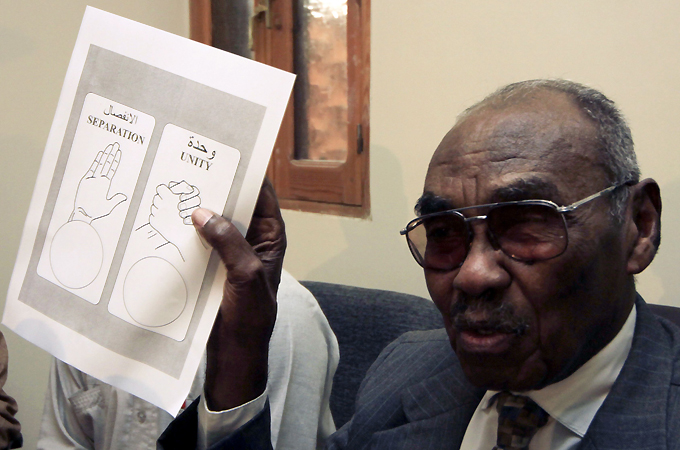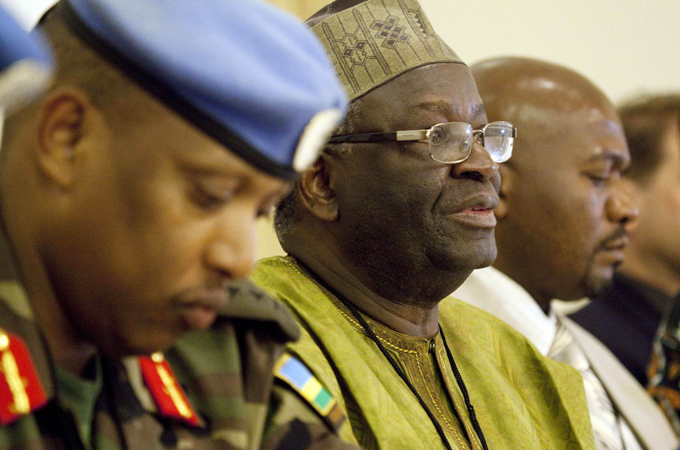Sudan vote ‘held up by donors’
Foreign donors refusing to give funding directly to commission organising independence referendum, official says.

 |
| Khalil criticised international donors for holding up preparations for the referendum [Reuters] |
Foreign donors have held up preparations for a referendum on south Sudan’s independence by not transferring money to the organisers and wasting money on pointless grants, according to the head of the organising body.
Mohamed Ibrahim Khalil, the chairman of the south Sudan referendum commission, on Sunday criticised international groupsfor failing to give their funds directly to the body as required by law.
“The party which has not availed us of any useable money so far is the international donors,” he said.
Khalil’s remarks came a day before southern voters were due to start registering to take part in the referendum.
Thousands of south Sudanese started registering for the long-awaited referendum on Monday.
Salva Kiir, the southern region’s president, was among the first to sign up for the vote, Reuters reported.
“We will vote on January 9. People must come out en masse. Otherwise people would have been fighting and dying for no cause. The referendum is done only once,” Kiir told the chanting crowd that gathered for the registration in the southern capital of Juba.
Officials with megaphones roamed the streets of Juba in the, calling on people to register.
One vehicle blared out a pro-independence song, “It’s the promised land and the promised land is coming”.
The vote is the climax of a 2005 peace deal between the north and the south of the country, which ended the longest civil war on the African continent.
It is already running three years late, delayed by disputes.
“A lot of people in the international community feel that perhaps Sudan is not ready to hold this referendum. Some feel it’s been a bit too rushed,” Al Jazeera’s Haru Mutasa reported from Juba, southern Sudan.
“They feel a lot of things on the ground aren’t actually prepared. There are still issues that people are bickering over.
“There’s issues of border demarcation, issues of citizenship, issues of how to share the oil wealth. And of course the threat of violence that people are afraid could happen if the process isn’t handled properly,” she said.
‘Spillover’ fears
Ibrahim Gambari, the head of the joint UN-African Union mission (Unamid), said on Sunday that his agency and the United Nations Mission in Sudan (Unamis) have prepared contingency plans in case of any possible north-south clashes ahead of January’s referendum.
“We in Darfur, that is Unamid and the people of Darfur, we have enough security problems … without the complication arising from the clashes across the border with south Sudan,” he told a news conference in the capital, Khartoum.
“We are also concerned about the spillover effect of the north-south border and the armed incidents occurring there, particularly in the no man’s land between south of Sudan and south of Darfur,” he said.
“That’s why Unamis and Unamid have developed contingency plans.”
On Saturday, the national Sudanese army accused the armed forces of southern Sudan of aiding rebels in Darfur, a day after clashes in a region between the country’s north and south close to Darfur.
While on Friday, the Sudanese army clashed with fighters of the Justice and Equality Movement (Jem) near Al-Meirem, an area bordering the south’s North Bahr al-Ghazal and the north’s South Kordofan, according to an army spokesman.
Gambari said that Jem was “a force to be reckoned with” and expressed fears that alliances between some Darfuri groups and the former rebel Sudan People’s Liberation Movement (SPLM) could be “rekindled as a result”.
“Before the end of the rains there was a feeling in some quarters that Jem was finished … Now, there is a feeling on their part, I think, because I met [exiled Jem leader] Khalil Ibrahim, to say ‘We’re still here’,” Gambari said.
“Sadly the Darfuris are witnessing this new military build-up, movement of troops and clashes as the date of the referendum approaches,” Gambari said.
‘Waste of money’
The US development agency (USAID) has budgeted up to $50m to help stage the referendum, but has said it would not pay any money directly to the commission organising the vote.
Andrew Mitchell, the minister for international development, said only the Sudanese government should pay the money to the commission.
 |
| Gambari, centre, said UN and AU forces in Sudan had contigency plans in case of violence [AFP] |
The national government has paid the commission nine million Sudanese pounds ($3.8 million) and the semi-autonomous southern government has contributed 10 million pounds, but Khalil criticised international partners for not even consulting the body on much of their work.
“They give us finished goods, materials just as you cater for a minor. You don’t give a minor cash in case they should misuse it but give them finished goods and services which, incidentally, we resent,” he said.
Khalil said foreign contractors and experts had been appointed by international donors, without them looking for Sudanese professionals able to do the same jobs.
The delay in funding had held already cause the commission to move into its new offices six weeks late.
“This is an utter waste of money,” he said. “We said to them that the schedule is very, very tight, pushed to the maximum and it does not have any margin for error.”
Sudan, Africa’s biggest nation, is scheduled to stage two referendums on January 9, one on the independence of southern Sudan and the other on whether the contested oil-rich Abyei region should join the north or south.
Registration is to start on Monday in Sudan but will be delayed for several days in Egypt, the US and Australia, which have sizeable Sudanese populations.